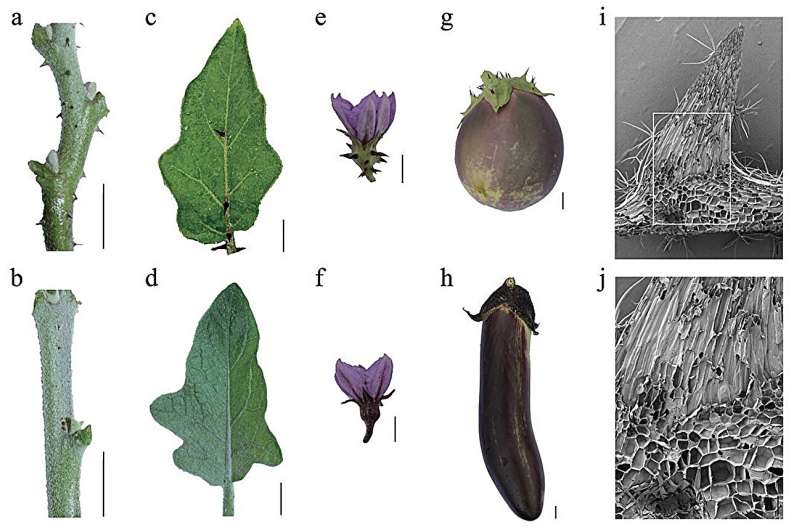This article has been reviewed according to Science X's editorial process and policies. Editors have highlighted the following attributes while ensuring the content's credibility:
fact-checked
peer-reviewed publication
trusted source
proofread
Smooth sailing for eggplant: Breakthrough in understanding prickle formation

Scientists have discovered the gene responsible for prickles in eggplants, a trait that complicates farming. Using advanced genetic techniques, they identified the Prickly Eggplant (PE) gene on chromosome 6 and pinpointed SmLOG1 as the key factor.
CRISPR-Cas9 gene editing confirmed that disabling SmLOG1 eliminates prickles, paving the way for prickle-free eggplant varieties. This breakthrough not only sheds light on prickle development but also promises to streamline eggplant cultivation and harvesting, benefiting the agricultural industry.
Eggplants, a staple crop globally, present significant challenges in cultivation and harvesting due to their prickles. These prickles, which serve as a natural defense mechanism, complicate handling and reduce efficiency in agricultural practices.
Addressing these issues is crucial for improving farming outcomes. Consequently, researchers are focused on understanding the genetic basis of prickle formation to develop prickle-free eggplant varieties. Based on these challenges, there is a pressing need to conduct in-depth research and identify solutions for more efficient eggplant cultivation.
Researchers from Jiangsu Normal University, in collaboration with the Chinese Academy of Agricultural Sciences, have made significant strides in this area. Their findings, published in the journal Horticulture Research on May 10, 2024, focus on the identification of a key gene responsible for the prickly phenotype in eggplants.
The research team employed bulk segregant RNA-sequencing (BSR-seq) and linkage analysis to identify the Prickly Eggplant (PE) gene on chromosome 6, which is crucial for prickle formation in eggplants. They discovered that the SmLOG1 gene, encoding a cytokinin biosynthetic enzyme, plays a pivotal role in this process.
Through CRISPR-Cas9 gene editing, they knocked out SmLOG1 in prickly eggplants, resulting in plants completely devoid of prickles. This confirmed the gene's essential role in prickle development.
Furthermore, the study identified a specific SNP in the SmLOG1 promoter region associated with prickle variation, which can be used as a molecular marker for breeding. This groundbreaking research not only advances our understanding of the genetic mechanisms behind prickle formation but also offers practical applications in breeding prickleless eggplant varieties, significantly enhancing agricultural efficiency and reducing the labor required for cultivation and harvesting.
Dr. Lei Zhang, the lead researcher, stated, "This breakthrough in understanding the genetic basis of prickle formation in eggplants is a significant step forward. It not only solves a long-standing agricultural problem but also showcases the power of genetic research in improving crop varieties."
The identification of the PE gene and its association with prickle formation paves the way for developing prickleless eggplant varieties through marker-assisted selection (MAS). This advancement holds promise for making eggplant cultivation and harvesting more efficient and less labor-intensive, ultimately benefiting farmers and the agricultural industry.
More information: Lei Zhang et al, PE (Prickly Eggplant) encoding a cytokinin-activating enzyme responsible for the formation of prickles in eggplant, Horticulture Research (2024). DOI: 10.1093/hr/uhae134
Journal information: Horticulture Research
Provided by NanJing Agricultural University




















